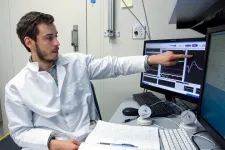(Press-News.org) BOSTON - Vitamin D deficiency strongly exaggerates the craving for and effects of opioids, potentially increasing the risk for dependence and addiction, according to a new study led by researchers at Massachusetts General Hospital (MGH). These findings, published in Science Advances, suggest that addressing the common problem of vitamin D deficiency with inexpensive supplements could play a part in combating the ongoing scourge of opioid addiction.
Earlier work by David E. Fisher, MD, PhD, director of the Mass General Cancer Center's Melanoma Program and director of MGH's Cutaneous Biology Research Center (CBRC), laid the foundation for the current study. In 2007, Fisher and his team found something unexpected: Exposure to ultraviolet (UV) rays (specifically the form called UVB), causes the skin to produce the hormone endorphin, which is chemically related to morphine, heroin and other opioids--in fact, all activate the same receptors in the brain. A subsequent study by Fisher found that UV exposure raises endorphin levels in mice, which then display behavior consistent with opioid addiction.
Endorphin is sometimes called a "feel good" hormone because it induces a sense of mild euphoria. Studies have suggested that some people develop urges to sunbathe and visit tanning salons that mirror the behaviors of opioid addicts. Fisher and his colleagues speculated that people may seek out UVB because they unknowingly crave the endorphin rush. But that suggests a major contradiction. "Why would we evolve to be behaviorally drawn towards the most common carcinogen that exists?" asked Fisher. After all, sun exposure is the primary cause of skin cancer, to say nothing of wrinkles and other skin damage.
Fisher believes that the only explanation for why humans and other animals seek out the sun is that exposure to UV radiation is necessary for production of vitamin D, which our bodies can't formulate on their own. Vitamin D promotes uptake of calcium, which is essential for building bone. As tribes of humans migrated north during prehistoric times, an evolutionary alteration might have been needed to compel them to step out of caves and into the sunshine on bitterly cold days. Otherwise, small children would have died of prolonged vitamin D deficiency (the cause of rickets) and weak bones might have shattered when people ran from predators, leaving them vulnerable.
This theory led Fisher and colleagues to hypothesize that sun seeking is driven by vitamin D deficiency, with the goal of increasing synthesis of the hormone for survival, and that vitamin D deficiency might also make the body more sensitive to the effects of opioids, potentially contributing to addiction. "Our goal in this study was to understand the relationship between vitamin D signaling in the body and UV-seeking and opioid-seeking behaviors," says lead author Lajos V. Kemény, MD, PhD, a postdoctoral research fellow in Dermatology at MGH.
In the Science Advances paper, Fisher, Kemény and a multidisciplinary team from several institutions addressed the question from dual perspectives. In one arm of the study, they compared normal laboratory mice with mice that were deficient in vitamin D (either through special breeding or by removing vitamin D from their diets). "We found that modulating vitamin D levels changes multiple addictive behaviors to both UV and opioids," says Kemény. Importantly, when the mice were conditioned with modest doses of morphine, those deficient in vitamin D continued seeking out the drug, behavior that was less common among the normal mice. When morphine was withdrawn, the mice with low vitamin D levels were far more likely to develop withdrawal symptoms.
The study also found that morphine worked more effectively as a pain reliever in mice with vitamin D deficiency--that is, the opioid had an exaggerated response in these mice, which may be concerning if it's true in humans, too, says Fisher. After all, consider a surgery patient who receives morphine for pain control after the operation. If that patient is deficient in vitamin D, the euphoric effects of morphine could be exaggerated, says Fisher, "and that person is more likely to become addicted."
The lab data suggesting that vitamin D deficiency increases addictive behavior was supported by several accompanying analyses of human health records. One showed that patients with modestly low vitamin D levels were 50 percent more likely than others with normal levels to use opioids, while patients who had severe vitamin D deficiency were 90 percent more likely. Another analysis found that patients diagnosed with opioid use disorder (OUD) were more likely than others to be deficient in vitamin D.
Back in the lab, one of the study's other critical findings could have significant implications, says Fisher. "When we corrected vitamin D levels in the deficient mice, their opioid responses reversed and returned to normal," he says. In humans, vitamin D deficiency is widespread, but is safely and easily treated with low-cost dietary supplements, notes Fisher. While more research is needed, he believes that treating vitamin D deficiency may offer a new way to help reduce the risk for OUD and bolster existing treatments for the disorder. "Our results suggests that we may have an opportunity in the public health arena to influence the opioid epidemic," says Fisher.
INFORMATION:
Fisher is the Edward Wigglesworth Professor of Dermatology at Harvard Medical School. Kemény is currently working as a resident physician in Dermatology at Semmelweis University in Budapest, Hungary.
This work was supported by a grant from the National Institutes of Health and the Dr. Miriam and Sheldon G. Adelson Medical Research Foundation.
About the Massachusetts General Hospital
Massachusetts General Hospital, founded in 1811, is the original and largest teaching hospital of Harvard Medical School. The Mass General Research Institute conducts the largest hospital-based research program in the nation, with annual research operations of more than $1 billion and comprises more than 9,500 researchers working across more than 30 institutes, centers and departments. In August 2020, Mass General was named #6 in the U.S. News & World Report list of "America's Best Hospitals."
For centuries, scientists, aeronautic designers and adventure-seekers have sought to replicate the qualities that allow birds to fly, namely wing-structure and balance. However, without an external mechanism such as a hot air balloon or airplane, humans have remained earth-bound, unable to use their own bodies to propel themselves into the stratosphere.
While researchers have long-focused on structural factors, like wings, that define the category of bird, a recent study published Science Advances by Professor Avihu Klar at the Hebrew University of Jerusalem's Faculty of Medicine and Prof. Claudio Mello from Oregon Health and Science University found that there are specific molecular characteristics that distinguish birds from animals, and these differences allow birds to flap their ...
The enormous potential of Big Data has already been demonstrated in areas such as financial services and telecommunications. An international team of researchers led by the IPK Leibniz Institute has now tapped the potential of big data for the first time on a large scale for plant research. To this end, data from three projects were used to increase the predictive accuracy for yield in hybrid varieties of wheat.
"We were able to draw on the largest dataset published to date, which contains information from almost a decade of wheat research and development," says Prof. Dr. Jochen Reif, Head of the Breeding Research Department at IPK. ...
What The Study Did: Editorial team composition by gender, race, ethnicity and sexual orientation was assessed at 25 leading medical and scientific journals in this survey study.
Authors: James W. Salazar, M.D., M.A.S., of the University of California San Francisco, is the corresponding author.
To access the embargoed study: Visit our For The Media website at this link https://media.jamanetwork.com/
(doi:10.1001/jamainternmed.2021.2363)
Editor's Note: The article includes conflicts of interest disclosures. Please see the article for additional information, including other authors, author contributions and affiliations, ...
What The Study Did: International medical graduates often practice as physicians in locations and specialties less preferred by U.S. medical graduates. This study reports on physician mortality from COVID-19, and on the mortality of international medical graduates in particular.
Authors: Abraham Verghese, M.D., of Stanford University in California, is the corresponding author.
To access the embargoed study: Visit our For The Media website at this link https://media.jamanetwork.com/
(doi:10.1001/jamanetworkopen.2021.13418)
Editor's Note: The article includes conflict of interest and funding/support disclosures. Please see the article for additional information, ...
What The Study Did: Researchers describe international hospitalization trends and key epidemiological and clinical features of children and youth with COVID-19.
Authors: Paul Avillach, M.D., Ph.D., of Harvard Medical School in Boston, and Florence Bourgeois, M.D., M.P.H., of Boston Children's Hospital, are the corresponding authors.
To access the embargoed study: Visit our For The Media website at this link https://media.jamanetwork.com/
(doi:10.1001/jamanetworkopen.2021.12596)
Editor's Note: The article includes conflict of interest and funding/support disclosures. Please see the article for additional information, including ...
The term "doomscrolling" describes the act of endlessly scrolling through bad news on social media and reading every worrisome tidbit that pops up, a habit that unfortunately seems to have become common during the COVID-19 pandemic.
The biology of our brains may play a role in that. Researchers at Washington University School of Medicine in St. Louis have identified specific areas and cells in the brain that become active when an individual is faced with the choice to learn or hide from information about an unwanted aversive event the individual ...
What The Study Did: This study of patients hospitalized with COVID-19 examines the association of anticoagulation treatment with mortality rates.
Authors: Valerie M. Vaughn, M.D., M.Sc., of the University of Utah in Salt Lake City, is the corresponding author.
To access the embargoed study: Visit our For The Media website at this link https://media.jamanetwork.com/
(doi:10.1001/jamanetworkopen.2021.11788)
Editor's Note: The article includes conflict of interest and funding/support disclosures. Please see the article for additional information, including other authors, author contributions and affiliations, conflict of interest and financial disclosures, and funding and support.
INFORMATION:
Media advisory: The full ...
What The Study Did: Researchers compared the association between symptoms and SARS-CoV-2 RNA levels in children and adults.
Authors: Erin Chung, M.D., of the University of Washington School of Medicine in Seattle, is the corresponding author.
To access the embargoed study: Visit our For The Media website at this link https://media.jamanetwork.com/
(doi:10.1001/jamapediatrics.2021.2025)
Editor's Note: The article includes conflict of interest and funding/support disclosures. Please see the article for additional information, including other authors, ...
So-called "good fatty acids" are essential for human health and much sought after by those who try to eat healthily. Among the Omega-3 fatty acids, DHA or docosahexaenoic acid is crucial to brain function, vision and the regulation of inflammatory phenomena.
In addition to these virtues, DHA is also associated with a reduction in the incidence of cancer. How it works is the subject of a major discovery by a multidisciplinary team of University of Louvain (UCLouvain) researchers, who have just elucidated the biochemical mechanism that allows DHA and other related fatty acids to slow the development of tumours. This is a major advance that has recently been published ...
What The Study Did: Researchers examined the associations between Medicare Advantage star ratings, which are created using data from all enrollees in a plan, and disparities in care for racial/ethnic minorities and enrollees with lower income and less education.
Authors: David J. Meyers, Ph.D., M.P.H., of the Brown University School of Public Health in Providence, Rhode Island, is the corresponding author.
To access the embargoed study: Visit our For The Media website at this link https://media.jamanetwork.com/
(doi:10.1001/jamahealthforum.2021.0793)
Editor's Note: The article includes conflict of interest ...


